
SİNEMA TRANSTOPIA: how cinema helps different communities to understand each other?
How does cinema help different communities understand each other? What does SİNEMA TRANSTOPIA do in Berlin? Is Russia’s war on Ukraine still a topic in German discourse?
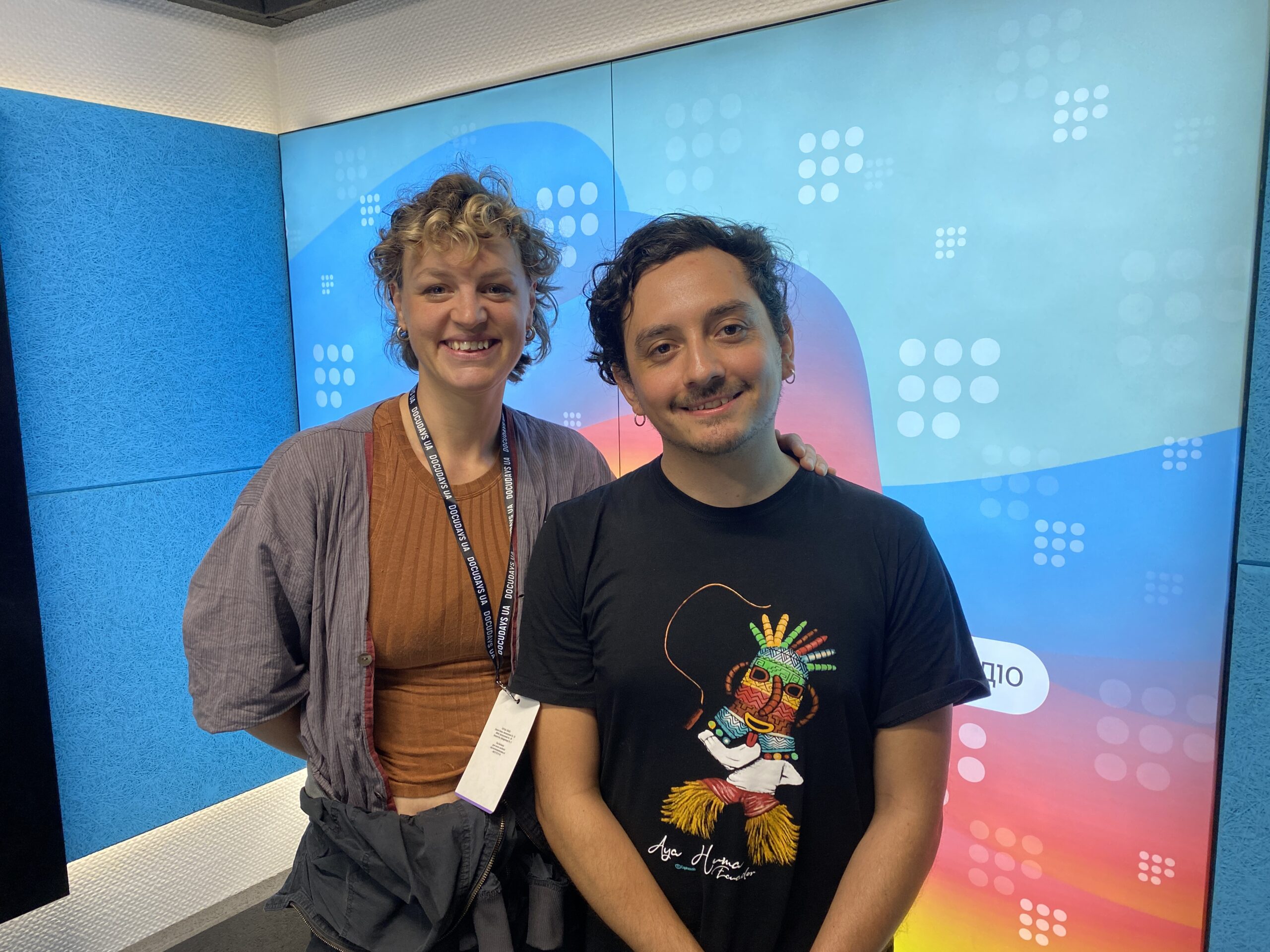
SİNEMA TRANSTOPIA is a cultural platform and arthouse cinema located in a working-class neighborhood in Berlin. It was founded to foster transnational exchange and is united by the theme of migration. The initiative aims to highlight topics that are important to the majority but are not properly represented.
SINEMA TRANSTOPIA was a part of DOCU/SYNTHESIS of DOCUDAYS UA, an international human rights documentary film festival in Kyiv, Ukraine. Hromadske Radio is a regular partner of DOCUDAYS UA. Hromadske Radio’s host Ana More recorded an interview with SİNEMA TRANSTOPIA curators Galo E. Rivera and Bethan Hughes.
What’s SINEMA TRANSTOPIA?
Ana More: You’ve been here for DOCUDAYS UA. So let’s start with the festival. How was your Docu, Galo?
Galo Rivera: It was very nice. We were super well received. We were invited by Sasha Nabieva. I hope I’m pronouncing this right. She’s been a great host. She’s curated part of the festival called DOCU/SYNTHESIS. I would totally recommend to follow up on her work, on her curation process, because it’s been really amazing what we saw at the festival.
Ana More: Bethany, you had a screening and a discussion at the Docudays. What was this discussion about?
Bethan Hughes: We had two screenings of two films: «Guestworkers» by Tuncel-Kurtiz and «100 сhildren waiting for a train» by Ignacio Aguero. During the discussion we talked about how cinema or film can create transnational solidarity or as a space of commons.
Ana More: I suppose not all of our listeners have heard about SINEMA TRANSTOPIA. Let’s start from the word «transtopia.» What does it mean?
Bethan Hughes: Erol Yildiz, a migration scholar, said that transtopia is a space where transnational connections converge and come together in kind of one zone.
And also the first part of the name of our initiative SİNEMA, it’s spelt with the Turkish S and I. That is because of our founders. When they started the project, they had a particular interest in kind of Turkish diasporic communities in Berlin, which has expanded to many more communities in Berlin. So that gives you a hint of where we’re coming from.
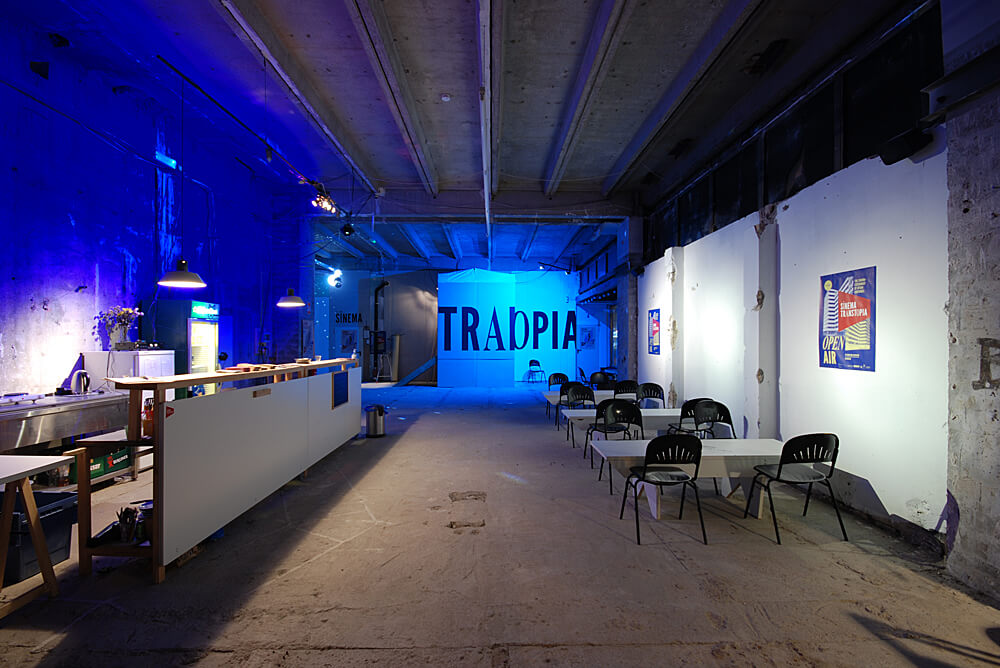
Ana More: And if we were talking about the space where you’re having your screenings in Berlin, what is the space, what is the place, and why was it important to you to choose such a location?
Bethan Hughes: Yeah, we’ve had a few different locations. We started back in 2014 with a very small project space before SINEMA TRANSTOPIA, which was called BIBAK, it’s Turkish for «take a look.» That space hosted film screenings, but also exhibitions, dinners, it was a place to work, an office.
And then in 2020, there was a call for cultural institutions based in Berlin to go to a space called Haus der Statistik, which is a very big old GDR building that was disused. People could go in that space and use it for whatever kind of cultural purpose that involved the community. And that’s where SINEMA TRANSTOPIA started.
The idea being to use film as kind of a central point to bring people together. And then the latest iteration of SINEMA TRANSTOPIA is a space in Berlin, Wedding, which is kind of where it started. We’ve come back to Wedding, which is also a space whith large communities of people who have a migrant background. Yeah, and we’ve kind of professionalised more along the way. It was very DIY to start.
Ana More: But you weren’t squatting the space?
Bethan Hughes: No, it’s very officially there, with an official rent to pay. The physical space is the key. Even through the pandemic, we did not do things online.
Ana More: Oh, wow.
Bethan Hughes: Because the central tenant of the project is bringing people together in a space.
Ana More: And you can’t do it online?
Galo Rivera: Yeah, we don’t think it would work online. Just going back to your question of it’s not a squatting space, I think, being migrants in Berlin, we’re used to having to squat spaces to find a space to do the things we do.
And I think that’s the principle of SINEMA TRANSTOPIA , just having a professional space, a serious space that is available for us, that also implies paying rent, right? And having it well-decorated, professional, very well-managed. And it never has this concept of being a, let’s say, segregated space. From the beginning, it was a very formal space, from Bibak, in the start in this neighborhood, to the move to Haus der Statistik, to the move back to Berlin Wedding.
And yes, as Beth said, the idea of being in this neighborhood, specifically, is because it’s a neighborhood in which the majority of people are not from Germany, originally.
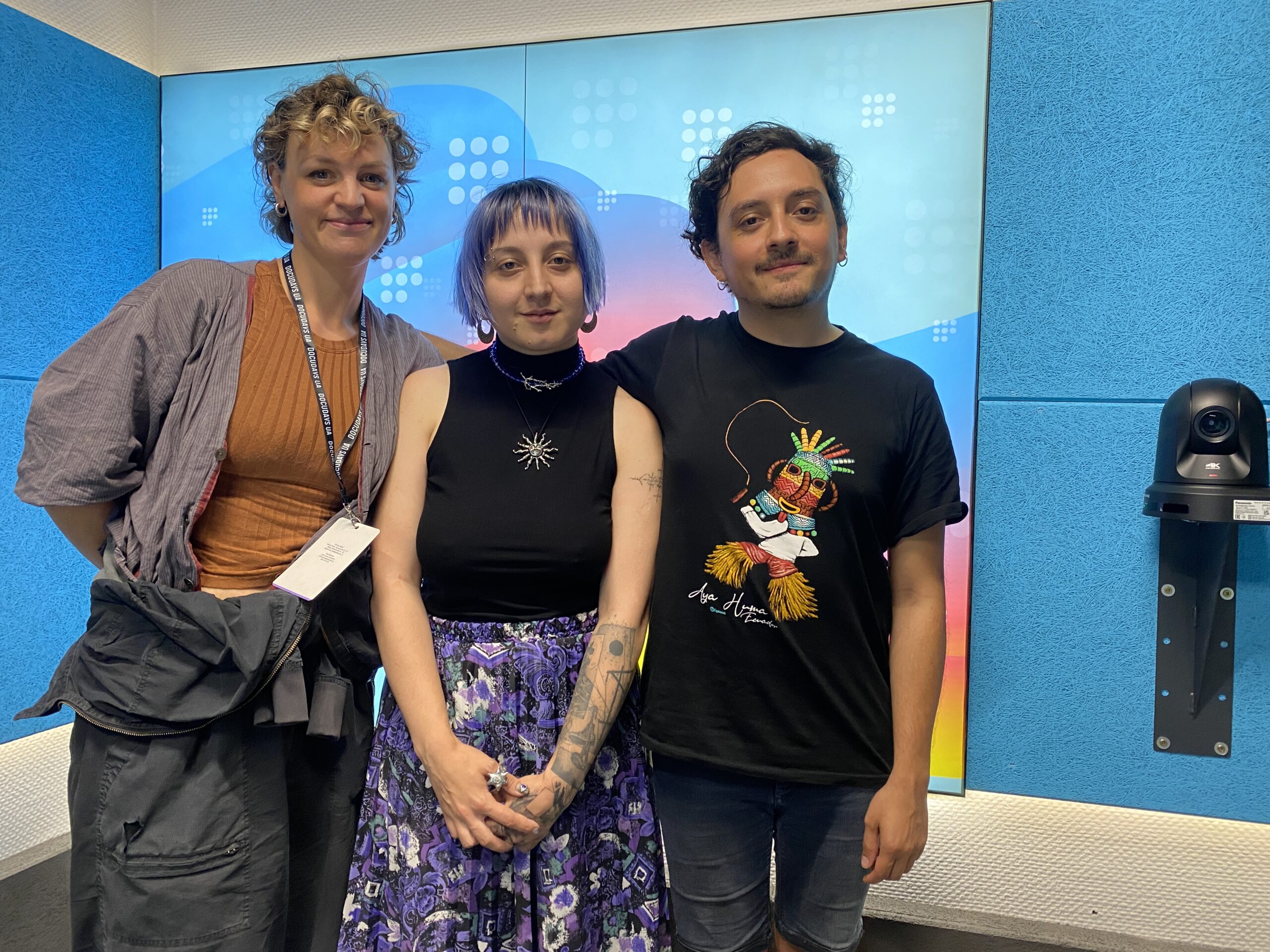
Being a migrant in Berlin: how hard is it?
Ana More: You are from Ecuador. How long have you been in Berlin?
Galo Rivera: Eight years now.
Ana More: And what was your experience? What obstacles have you come onto?
Galo Rivera: Oh, so many. I cannot make a list. I think making a list is too long, and it’s also a very traumatic experience.
Migration is always a traumatic experience. Acknowledging different types of migration, there’s a level in which privilege makes migration easier for certain people, for certain genders, for certain appearances, for certain bodies. And in that sense, I came to Berlin as a student, so I would say it’s a quite privileged way to move to Berlin.
But still, the difficulties are many, from the language, the understanding of the system, the intricacies of the system. And this connects to SINEMA TRANSTOPIA. Where is our space in the city? Because we’re also inhabitants of the city.
Ana More: Yeah, it’s an important topic for Ukraine too, because a lot of Ukrainians were forced to leave their homes. And we are having a lot of experiences now from different countries, how people are treated there. But there is a special treatment for Ukrainians. At least there was at the beginning. Maybe not so visible now. I’m not sure, because I don’t have such an experience.
One of the members of SINEMA TRANSTOPIA, Malve Lippmann, said that it is really important for you to show films that might not be held in official archives. Why so, Galo?
Galo Rivera: I’m going to speak specifically about my case and the Latin American case. These are films that are not selected for festivals and are not translated into languages that are understandable for the people organizing archives in Germany. That’s the reason.
But the key reason, I would say, is because we have our own stories and our own versions of how we tell the stories of our territories. These stories are absent from the archives and from history. So, for us, it’s really important to bring these stories to a space in Berlin. It’s not necessarily about Berlin citizens having access to them, but about us, as communities living in Berlin and also being citizens of Berlin, wanting access to these stories. Often, we don’t even have access to them in our own territories. It’s been a very important task.
Ana More: Have you been working with the local directors themselves? How do you find these films? Where do you get them from?
Bethan Hughes: I would also add to Gallo’s point about films not held by official archives. It can also be for practical reasons.
For instance, one of the films we showed here, ‘Gastarbeiterstrasse’ or ‘Guestworkers Road,’ was commissioned by a Swedish television company and made by a Turkish director. The film concerns the life of the so-called guest workers in Germany. It is entirely about Germany, German society, and German politics, but it would not necessarily be found in a German archive because of the transnational conditions of its production and reception.
There are many instances like this that fall through the gaps. It’s about assembling these works that are not canonized in German high culture.
Ana More: Where do you get these films? Are there many different sources?
Bethan Hughes: Chan and Malve, the initial founders of SINEMA TRANSTOPIA, have done several projects working in institutions set up for migrant life, which I believe is in Frankfurt or somewhere in West Germany. When Chan and Malve were in the archives, they found an old copy of a film called ‘Karakafa,’ another transnational film. It was produced by a Turkish director and shot in Germany but never listed as a German film. They digitized it and brought it back to audiences in Germany because it depicted life in Germany for those people. Other films are brought to us. Now that we are known as a space where these narratives can be seen and discussed, people come to us.
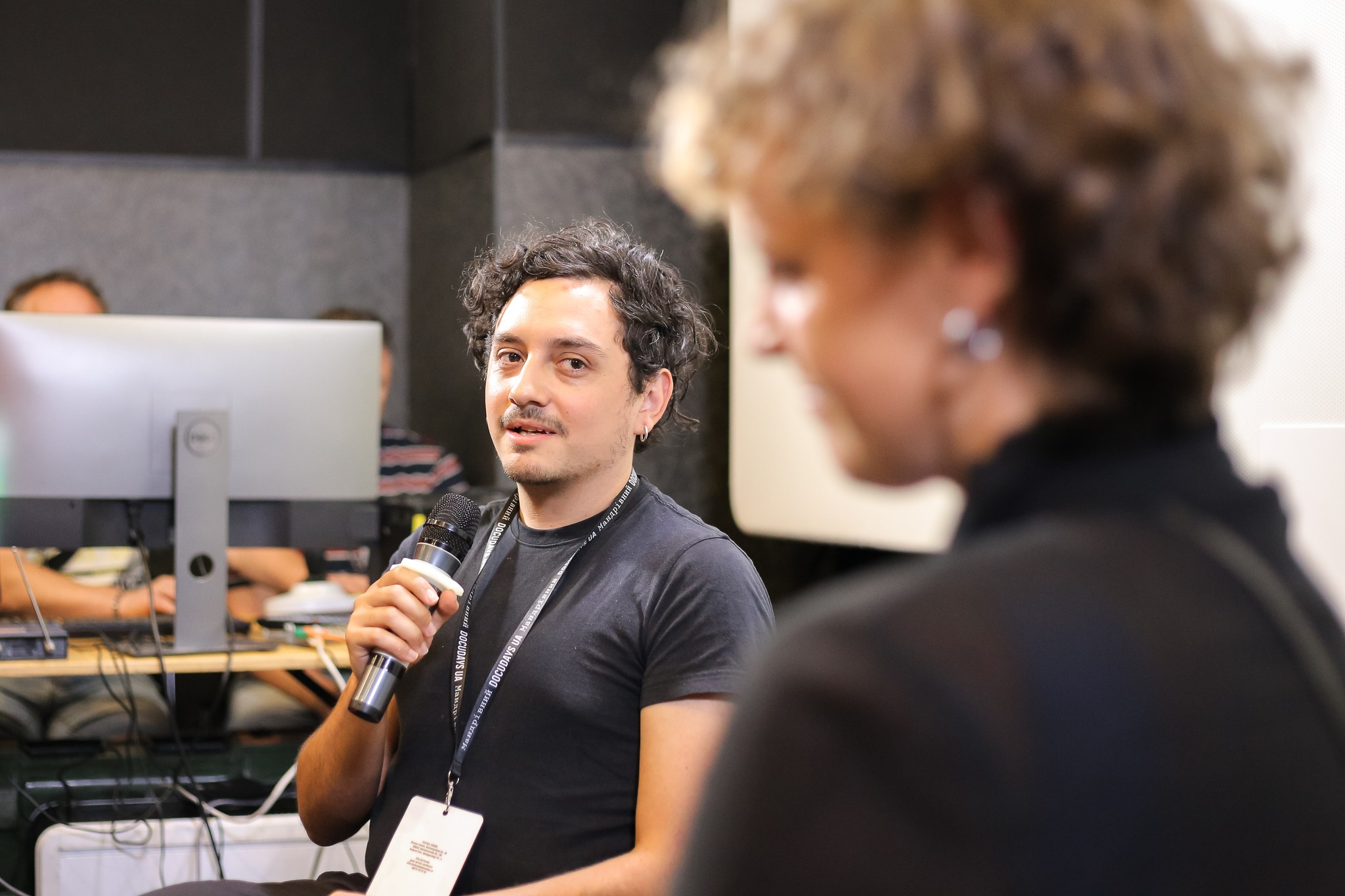
Galo Rivera: Yeah, and connecting back to Docudays, just to share the experience of these two films we brought, it’s interesting to note some limitations that exist when large cinematic industries and corporations control what we see and don’t see in the big, more official cinema spaces in Germany. You end up missing films that don’t fit into the parameters set by the distribution companies. The two films we brought, ‘Guestworkers Road’ and ‘A Hundred Kids Waiting for a Train,’ still have their screening rights held by the authors of the films.
To screen these films, you have to contact the authors. The author of ‘Guestworkers Road’ has passed away, so the owner of the rights is now his wife, and she didn’t even charge Docudays for screening it. The owner of the Chilean film is still the Chilean director, who lives in Chile, and we had to contact him to get the film. Every film has its own story about how we get to it.
Ana More: And it’s also about networking and connections, right?
Galo Rivera: I mean, a Chilean film is more accessible to me. I’m not saying that I have a key to open all Latin American films, but it’s more accessible for me than for someone born and raised in Berlin.
What about post-colonial discourse in Berlin?
Ana More: SINEMA TRANSTOPIA moves away from a Eurocentric gaze towards transnational, post-migrant, and post-colonial perspectives. In Ukraine, especially after the full-scale invasion and severing ties with Russian culture, we reflect on our post-colonial heritage even more. What are the themes important to you in exploring post-colonial discourse in Berlin? Let’s start with you, Beth.
Bethan Hughes: I have to think more about this. It’s quite a complex question. I would say that many people come to Berlin looking for this kind of discourse. When they arrive, some ideas are unlocked because Berlin is known for its cultural and discursive spaces. There are many other institutions, organizations, and collectives in the city that are exploring similar ideas, so we are not alone in this particular interest.
Ana More: I guess it’s different in Ukraine. Despite having more than 30 years of independence, we were still closely connected to the empire that once owned Ukraine—Russia. This has only started to change massively in the last two or three years. I suppose the experience in Berlin and Germany is much longer; this discourse has been part of the culture and politics for a while.
Galo Rivera: Not necessarily.
Ana More: Yeah?
Galo Rivera: Maybe it’s been longer in certain sectors of society, but a large part of society has issues with terms like decolonial or decolonialize. There’s a sector that opposes these concepts. I can’t definitively say what post-colonial means in Berlin, but what I’ve learned with SINEMA TRANSTOPIA is that every community has a different idea of what post-colonial is.
The key is seeing colonialism as an act of dominance and oppression. Post-colonialism in our practice involves ensuring we, as film selectors and a physical space with access to resources, do not exert the same violences that were exerted on us. This requires a lot of thinking and empathizing. At SINEMA TRANSTOPIA, there is a strong exercise of empathy and inclusion, viewing every part of history suppressed by colonial dynamics as part of human history. It’s very collaborative when you see it this way because you understand that you are not dictating anyone’s story, but recognizing that every story is important.
Ana More: And you let the communities tell their stories by screening their movies, not imposing a Eurocentric gaze again.
Galo Rivera: Exactly. That’s part of not exerting the same violences.
Bethan Hughes: Yeah, there’s not one curator. Some programs are curated by SINEMA TRANSTOPIA, which now involves many people, but there are also guest curators, including international ones. Additionally, certain programs examine film or moving image artifacts that are racist or contain the violence Galo mentioned. The aim is to contextualize them, to explore the foundations of certain attitudes towards people with migrant backgrounds, and to reframe these artifacts in a contemporary view.
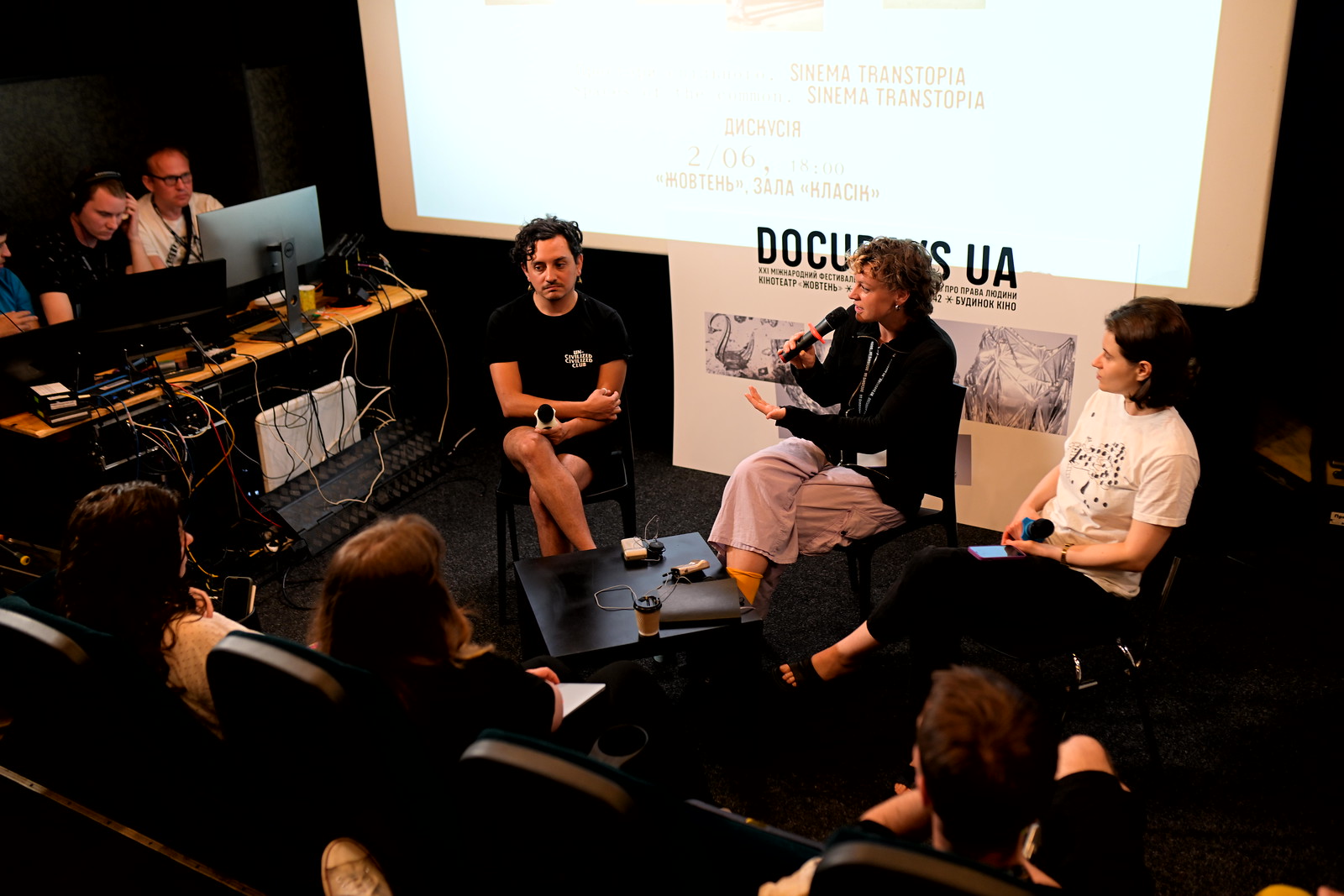
Is Ukraine present in German culture’s agenda?
Ana More: Yeah, and a few more questions regarding Ukraine – I’m sorry, but you are in Kyiv, so… I was in Berlin in the summer of 2022, and I was quite struck by the intensity of connection with Russian culture. Centrum Liberale Moderne presented us with the results of their research on the topic, explaining some of the reasons for this connection. One of them, they believe, is the feeling of guilt towards Russia because of the Second World War.
So now more than two years have passed since the world witnessed Russian atrocities in Ukraine. Has there been any reflection in the Berlin cultural community on its ties to Russia, its culture of remembrance of the Second World War, or anything in this context?
Bethan Hughes: Hmm, that’s a difficult question. I think Germany has not dealt with its own history in many ways. I think, at best, it’s an ongoing process. At worst, it’s not happening. But specifically regarding its ties with Russian culture, I couldn’t say enough to make it meaningful.
Galo Rivera: Yes, and I think that’s a question for someone who has lived in Berlin their whole life and has seen all these dynamics. I completely understand what you mean about the dynamics of this connection to, and perhaps romanticization of, Soviet culture. I don’t even want to use the wrong term because this is quite distant to me. But no, I see this connection, but I don’t know how to judge it from my perspective as an immigrant.
Ana More: Yes, and while I was preparing for the interview and reading everything I could find about SINEMA TRANSTOPIA, I noticed that you propose an alternative to the mainstream culture of remembrance in Germany. What is the mainstream culture of remembrance in Germany, and what do you propose?
Galo Rivera: I think you’ve already touched on this topic, which is German guilt and the culture of remembrance. For me, in Germany, it means a culture of guilt and denying one’s actions. For example, these racist movies that were made – this is also memory. You did all these things in society, and you have to watch it and be critical about it, not just deny it and say, ‘Oh, now this is completely off the spectrum, we never talk about this.’ Because this ends up really badly, I feel. And this isn’t unique to Germany.
We’ve seen stories like this. This is the beauty of watching films and transnationalizing narratives because you can even compare it to an individual level – it’s an unresolved trauma. It’s a trauma that, from an outsider’s perspective, German society doesn’t want to talk about, and it’s just left there. And the more you leave it aside without talking about it, without reacting to it, it just grows bigger and bigger and falls apart. And I feel that’s what’s happening.
Bethan Hughes: Yeah, I think it’s a good question. But I would say the tactics for dealing with this are exactly what we try to do: present these narratives, bring these people in, create this space. And at some point, have old German institutions accept cinema as a part of German culture. This is also part of society, and it cannot be ignored.
Ana More: Yeah, you’ve also talked about the variety of topics that circulate in Berlin’s cultural community. I recently met with my friend from Berlin, who is also a migrant from the Czech Republic. She’s an artist deeply involved in the cultural community, but she told me she’s just tired of the intensity of everything going on in Berlin and the things you have to pay attention to. Of course, I asked her about the Russia-Ukraine war theme – has it been overshadowed by the Israeli-Palestine conflict and all the other events happening? She said yes, the war in Ukraine was the main topic in 2022, but now much less so.
I understand there are a lot of things happening concerning Berlin or Germany in general, but what are today’s most prominent themes in Berlin for you? Like, if you see an event, a discussion, or an exhibition on this topic, you’ll go check it out.
Bethan Hughes: Or a protest.
Ana More: Yeah.
Bethan Hughes: Yeah, surely. Germany’s relationship with Israel is definitely a significant part of cultural discourse and people’s everyday lives at the moment. The extent to which this is part of institutional dialogue is another question, as it can also be hard to talk about freely and openly due to censorship.
There are people trying to address it in different ways, but there is also the canceling of spaces and the removal of funding. So, I think this is a key question of our time.
Ana More: And what do you see, Galo?
Galo Rivera: Yeah, I think it is definitely this topic of Germany’s involvement with Israel.
But I can relate a bit to your friend’s comment about the overwhelming nature of everything happening in Berlin. It’s a very vibrant city with many different communities navigating, sometimes even parallelly, with different stories in the same city that never merge. It might be difficult, but it’s also a city where there’s a lot of contemplation. When you question a specific topic or a contemporary issue that German society is dealing with, there’s a lot of pressure, which I feel is good, to include all these other narratives of the violence that has been accepted towards us as migrants. How is this all connected? This is intersectionality, right? And it’s a city where, for me personally, but I feel for many others too, because all these questions are on the table so often and there’s so much pressure, you also end up realizing the violence you might be exerting. This is very important.
And I agree it’s exhausting, but in the circles we operate in, which are more cultural and artistic, these are circles dominated by very privileged people. You can’t say the pressure to consider others or empathize with other struggles is tearing you apart because there are literally people being torn apart and killed for being who they want to be or for their stance on self-determination. So, I feel it’s a city with a lot of pressure, but it comes from being such a privileged place, and I think that’s a good thing.
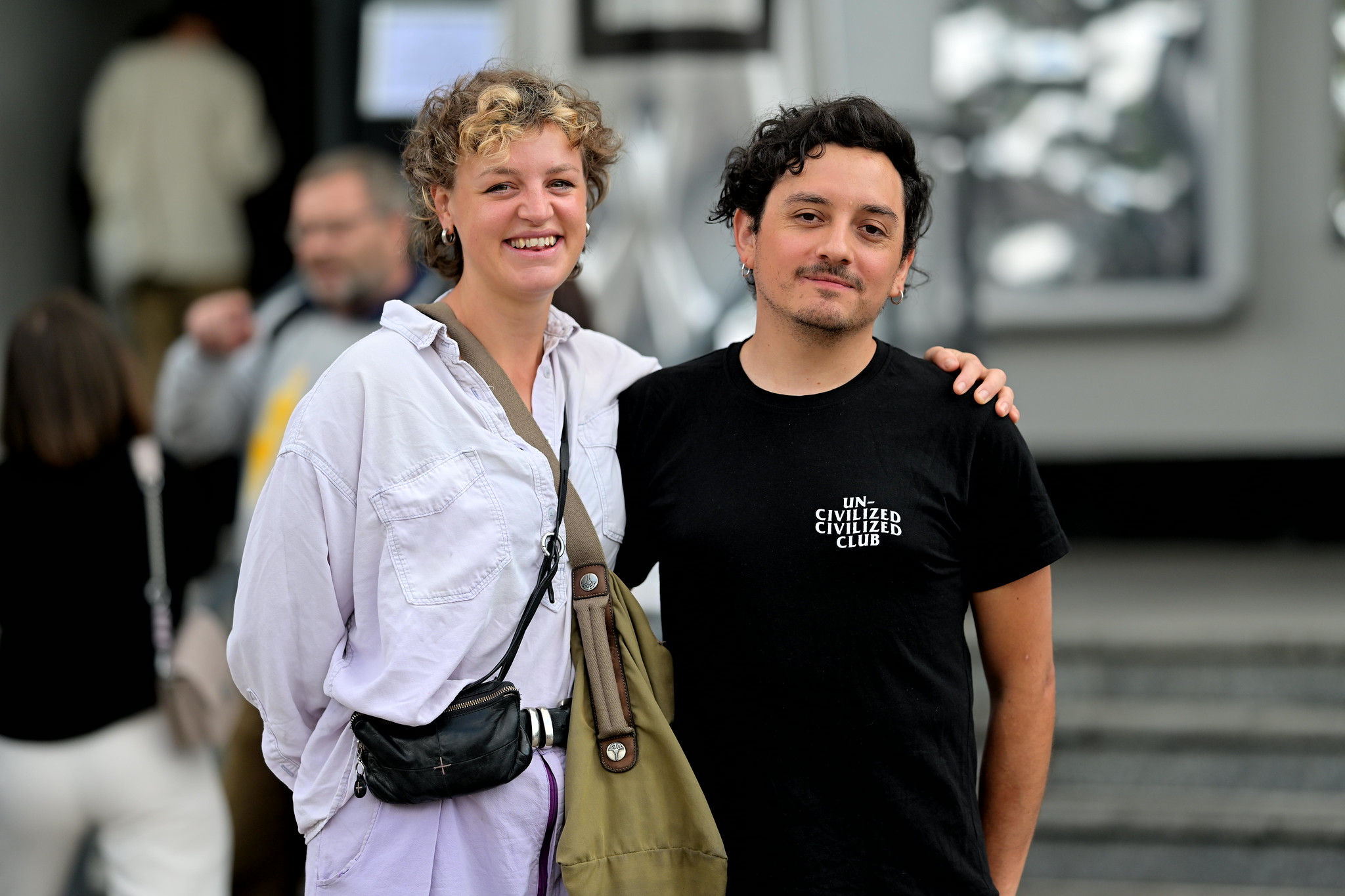
SINEMA TRANSTOPIA and DOCUDAYS UA
Ana More: And to end on a nice note, can you announce anything that’s going to happen at SINEMA TRANSTOPIA or that’s already happening, any screens, festivals, for our listeners who can listen from Germany, because we have a bit of German audience at our English web version, so for them to look forward to?
Bethan Hughes: I mean, we have a really packed program. We have six days a week, more or less, all through the year, apart from one month in summer, in August. Maybe one particular event that’s coming up is called Cinema of Commoning, which is a platform that was set up in 2020, 2021. The first edition happened in 21, and it’s a symposium with screenings and events, a get-together of alternative cinema spaces from around the world.
So the first set of partners that we had in 2021, there will now be a new set of partners with Cinema of Commoning 2, and the idea is to kind of build a network between these different alternative cinema spaces or non-profit cinema spaces around the world. But aside from that, we have open-air screening program, something curated by Galo, kind of Brazilian films. Yeah.
Ana More: And Galo, will you continue your connection with DOCUDAYS UA? Will we see SINEMA TRANSTOPIA at the next festival?
Galo Rivera: Hopefully. And more than that, I hope, because as a space, what we do is to make it accessible to communities that we feel their narratives are sometimes underrepresented, or communities that are in the process of having to recreate an identity after, I don’t know, a long time of identity erasure. And for sure, in that sense, the Ukrainian community should also have access to this space.
It’s a bit problematic because how we work usually is that we need connections with the community for it to happen, because we don’t want to take the narrative of what do we say for Ukrainians. We can learn a lot, and we should learn a lot.
Ana More: You can give the platform.
Galo Rivera: But we can give the platform, and that’s the idea. And being here was a really wonderful opportunity because there’s a lot of people interested. There’s some people that even came from Berlin, also Ukrainians living in Berlin that came to Docudays.
And this is a really good connection because it’s people that will have this power of bridging between the curators of Docudays that invited us and our space in Berlin. So I think things will happen during the year, and hopefully Docudays, in another year, we can also come by. Hopefully also not us and someone else from Cine Transopia, so we can still practice, this practice of ours, which is to have different roles in the organization.
Ana More: Yes and I also have a friend of our for you – a Ukrainian friend, a poet, she has been organizing Ukrainian screenings in Berlin. So maybe you would be interested in her work.



